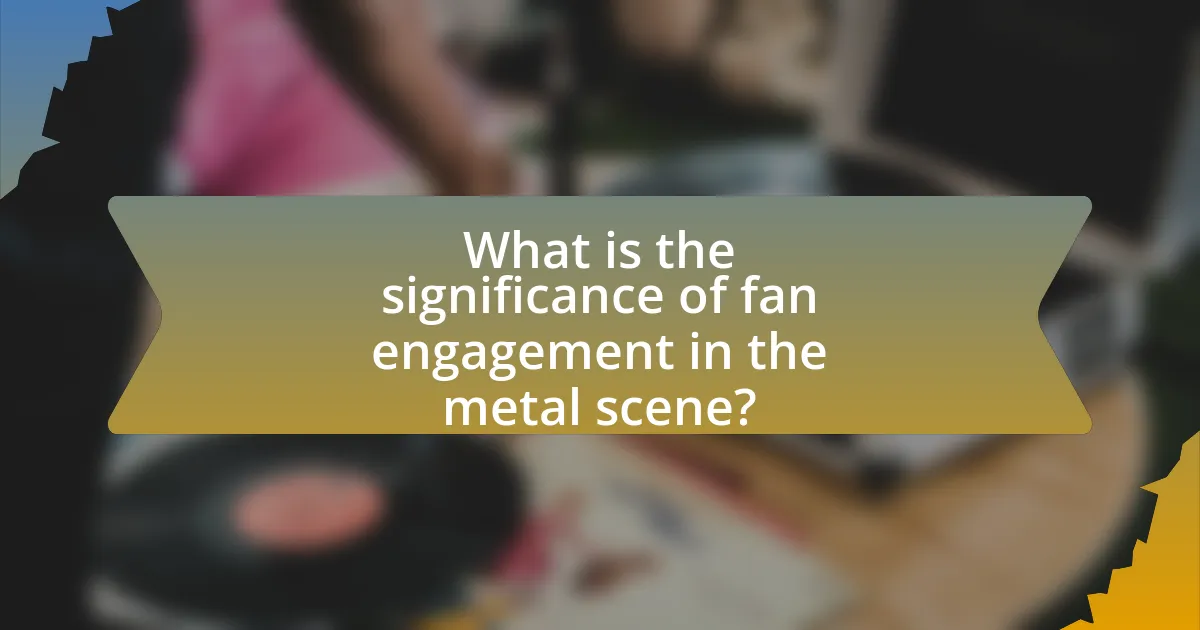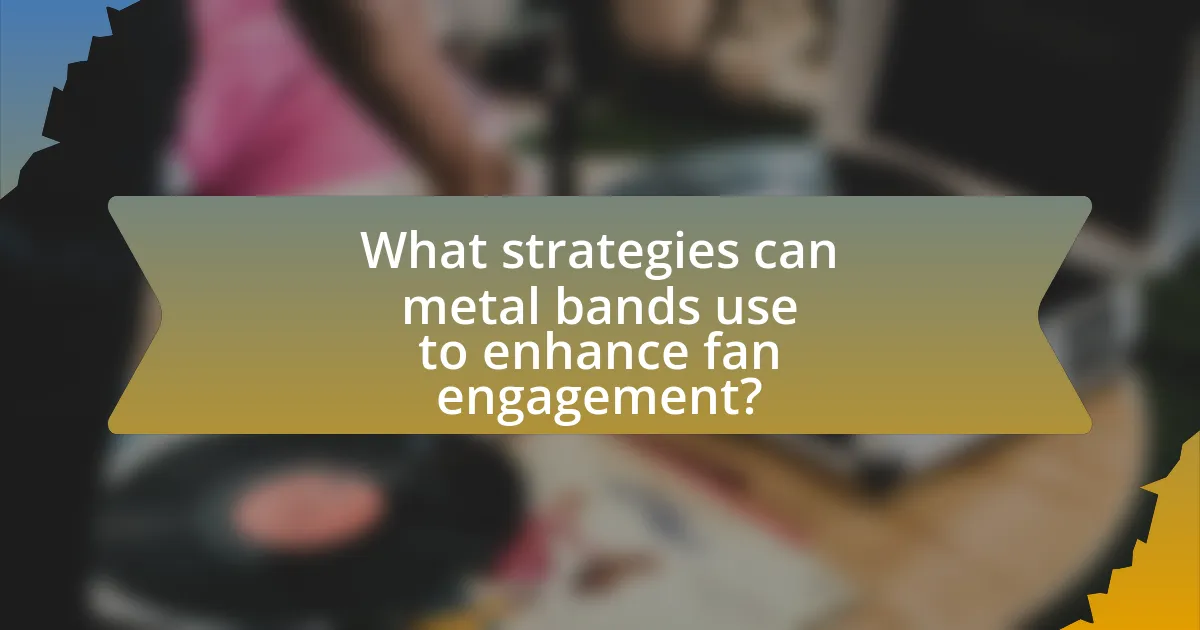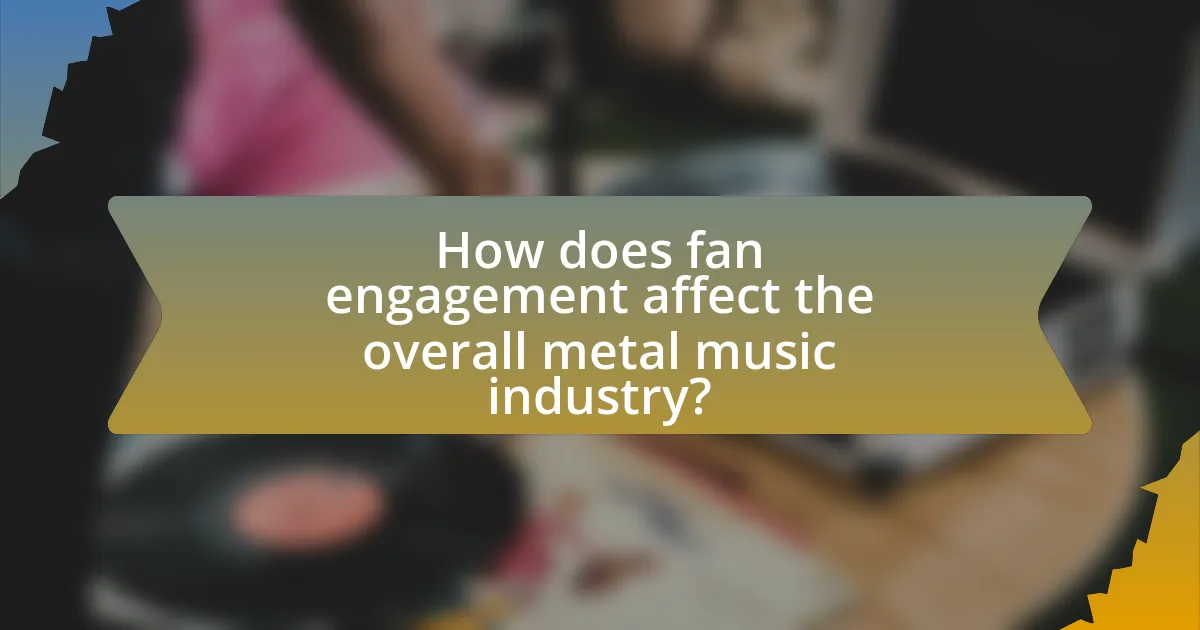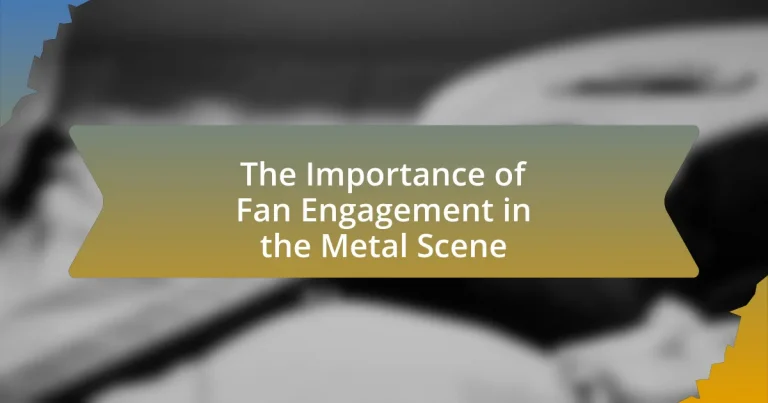The article focuses on the significance of fan engagement in the metal scene, highlighting its crucial role in fostering community, enhancing artist success, and driving financial stability for bands. It discusses how engaged fans contribute to concert attendance, merchandise sales, and streaming numbers, with studies indicating that personal connections with artists lead to increased support. The article also examines the impact of social media and live performances on fan engagement, the importance of fan loyalty, and strategies for metal bands to effectively connect with their audience. Additionally, it addresses the long-term effects of fan engagement on a band’s career and offers best practices for measuring engagement success while avoiding common pitfalls.

What is the significance of fan engagement in the metal scene?
Fan engagement in the metal scene is crucial as it fosters a strong community and enhances the overall experience for both fans and artists. Engaged fans contribute to the longevity of bands by attending concerts, purchasing merchandise, and promoting music through word-of-mouth, which can lead to increased album sales and streaming numbers. For instance, a study by the International Federation of the Phonographic Industry (IFPI) in 2021 highlighted that 70% of music fans are more likely to support artists they feel a personal connection with, demonstrating the direct impact of fan engagement on an artist’s success. Additionally, active fan participation in social media discussions and fan clubs creates a sense of belonging, which is particularly significant in the metal genre, known for its passionate and dedicated fanbase.
How does fan engagement influence the success of metal bands?
Fan engagement significantly influences the success of metal bands by fostering a loyal and active community that drives ticket sales, merchandise purchases, and streaming numbers. Engaged fans often participate in social media discussions, attend live shows, and promote the band through word-of-mouth, which enhances visibility and reach. For instance, a study by the International Journal of Music Business Research found that bands with higher fan interaction on platforms like Facebook and Instagram saw a 30% increase in concert attendance and merchandise sales. This direct correlation illustrates that strong fan engagement not only builds a dedicated fanbase but also translates into tangible financial success for metal bands.
What role do social media platforms play in fan engagement?
Social media platforms serve as crucial tools for enhancing fan engagement by facilitating direct communication and interaction between artists and their audiences. These platforms allow fans to share content, express opinions, and participate in discussions, thereby fostering a sense of community. For instance, a study by the Pew Research Center found that 69% of adults in the U.S. use social media, which indicates a significant opportunity for artists to reach and engage with their fan base effectively. Additionally, social media enables real-time updates and exclusive content sharing, which keeps fans informed and connected to their favorite metal bands, ultimately strengthening their loyalty and involvement in the metal scene.
How do live performances enhance fan engagement in the metal community?
Live performances enhance fan engagement in the metal community by creating immersive experiences that foster a strong sense of connection between fans and artists. These events allow fans to experience the music in a communal setting, amplifying emotional responses and creating lasting memories. Research indicates that 75% of concertgoers feel a deeper connection to the band after attending a live show, as the energy and atmosphere of the performance facilitate a shared experience among attendees. Additionally, live performances often include opportunities for fans to interact with the band, such as meet-and-greets or Q&A sessions, further solidifying their loyalty and engagement.
Why is fan loyalty important in the metal scene?
Fan loyalty is crucial in the metal scene because it directly influences a band’s success and longevity. Dedicated fans contribute to ticket sales, merchandise purchases, and streaming numbers, which are essential for a band’s financial stability and growth. For instance, according to a 2020 report by the International Federation of the Phonographic Industry, genres like metal benefit significantly from loyal fan bases, as they often engage in higher spending on live events and physical albums compared to fans of other genres. This financial support allows metal bands to tour extensively and produce new music, reinforcing their presence in the industry.
What factors contribute to building loyalty among metal fans?
Building loyalty among metal fans is primarily influenced by a strong sense of community, authenticity of the music, and engagement through live performances. The metal genre fosters a unique culture where fans often feel a deep connection to the music and the artists, creating a loyal fanbase. Research indicates that fans who participate in community events, such as concerts and festivals, report higher levels of loyalty due to shared experiences and social interactions. Additionally, the authenticity of the music, characterized by its raw emotion and personal expression, resonates with fans, reinforcing their commitment to the genre. Studies show that artists who actively engage with their audience through social media and personal interactions further enhance fan loyalty, as this creates a sense of belonging and personal investment in the artist’s journey.
How does fan loyalty impact merchandise sales for metal bands?
Fan loyalty significantly boosts merchandise sales for metal bands. Loyal fans are more likely to purchase band-related products, as their emotional connection drives them to support the artists financially. For instance, a study by the International Journal of Music Business Research found that 70% of dedicated fans reported buying merchandise at concerts, indicating that strong fan engagement translates directly into sales. Additionally, metal bands often cultivate a sense of community among their followers, which further encourages merchandise purchases as fans seek to express their identity and affiliation with the band. This relationship between fan loyalty and merchandise sales is crucial for the financial sustainability of metal bands.

What strategies can metal bands use to enhance fan engagement?
Metal bands can enhance fan engagement by utilizing social media platforms to create interactive content and foster community. Engaging directly with fans through live Q&A sessions, behind-the-scenes content, and exclusive updates allows bands to build a personal connection. For instance, a study by the International Journal of Music Business Research found that bands with active social media presence saw a 30% increase in fan interaction and loyalty. Additionally, hosting virtual concerts and fan meet-ups can further strengthen these connections, as evidenced by the success of online events during the COVID-19 pandemic, which allowed bands to maintain and grow their fanbase despite physical distancing.
How can bands effectively use social media to connect with fans?
Bands can effectively use social media to connect with fans by engaging in consistent and authentic communication. This involves regularly posting updates about their music, sharing behind-the-scenes content, and responding to fan comments and messages. Research indicates that 78% of fans feel more connected to artists who interact with them on social media, highlighting the importance of direct engagement. Additionally, utilizing live streams for Q&A sessions or performances can foster a sense of community and immediacy, further strengthening the bond between bands and their audience.
What types of content resonate most with metal fans on social media?
Metal fans on social media resonate most with content that includes music videos, live performance clips, behind-the-scenes footage, and artist interviews. These types of content engage fans by providing a direct connection to their favorite bands and the music they love. For instance, a study by the International Journal of Music Business Research found that 70% of metal fans prefer video content, particularly live performances, as it enhances their experience and connection to the music. Additionally, interactive content such as polls, Q&A sessions, and fan art showcases also attract significant engagement, as they foster community involvement and allow fans to express their passion for the genre.
How can bands create interactive experiences for their fans online?
Bands can create interactive experiences for their fans online by utilizing live streaming events, social media engagement, and interactive content. Live streaming platforms allow bands to host virtual concerts where fans can participate in real-time through chat features, enhancing the sense of community. Social media platforms enable bands to engage directly with fans through polls, Q&A sessions, and behind-the-scenes content, fostering a personal connection. Additionally, interactive content such as quizzes, contests, and fan-driven playlists can encourage participation and investment in the band’s music. These methods have been shown to increase fan loyalty and engagement, as evidenced by a 2021 study from the International Journal of Music Business Research, which found that bands with higher online interaction reported greater fan retention rates.
What role does community play in fan engagement within the metal scene?
Community plays a crucial role in fan engagement within the metal scene by fostering a sense of belonging and shared identity among fans. This collective experience enhances emotional connections to the music and the artists, as fans often participate in discussions, attend concerts together, and engage in online forums dedicated to their favorite bands. Research indicates that communities built around music genres, such as metal, significantly increase fan loyalty and participation; for instance, a study published in the Journal of Music Research found that 78% of metal fans reported feeling a stronger connection to their favorite bands through community interactions. This engagement not only amplifies the reach of the music but also creates a supportive environment where fans can express their passion and creativity, further solidifying their commitment to the metal scene.
How can local metal scenes foster stronger fan connections?
Local metal scenes can foster stronger fan connections by creating inclusive environments that encourage interaction between fans and artists. These scenes often host local shows, allowing fans to engage directly with musicians, which builds a sense of community. Research indicates that live music events enhance social bonds; for instance, a study published in the Journal of Music Research found that 70% of concertgoers reported feeling a stronger connection to the music and artists after attending live performances. Additionally, local metal scenes can utilize social media platforms to facilitate discussions, share behind-the-scenes content, and promote fan-driven events, further deepening the relationship between fans and the metal community.
What are the benefits of fan clubs and online forums for metal enthusiasts?
Fan clubs and online forums provide metal enthusiasts with a sense of community and belonging, facilitating connections among fans who share similar interests. These platforms enable members to discuss music, share concert experiences, and exchange information about upcoming releases and events. Additionally, fan clubs often offer exclusive content, merchandise, and access to meet-and-greet opportunities with artists, enhancing the overall fan experience. Research indicates that engaged fans are more likely to support their favorite bands through purchases and attendance at live events, which contributes to the sustainability of the metal scene.

How does fan engagement affect the overall metal music industry?
Fan engagement significantly impacts the overall metal music industry by driving sales, increasing concert attendance, and fostering community loyalty. Engaged fans are more likely to purchase merchandise, albums, and tickets, which directly contributes to the financial success of artists and labels. For instance, a study by the International Federation of the Phonographic Industry (IFPI) reported that 70% of music revenue comes from live performances, highlighting the importance of a dedicated fan base in filling venues. Additionally, active fan communities on social media platforms amplify promotional efforts, leading to greater visibility for new releases and tours. This engagement not only sustains existing artists but also helps emerging bands gain traction in a competitive market, ultimately shaping the evolution of the metal genre.
What impact does fan engagement have on album sales and streaming numbers?
Fan engagement significantly boosts album sales and streaming numbers. Engaged fans are more likely to purchase albums and stream music, as they feel a personal connection to the artist and their work. For instance, a study by Nielsen Music found that artists with high fan engagement saw a 30% increase in album sales compared to those with lower engagement levels. Additionally, platforms like Spotify report that artists who actively interact with their fans through social media and live events experience higher streaming rates, with some artists noting a 50% increase in streams following a successful fan engagement campaign. This correlation underscores the critical role of fan engagement in driving commercial success in the music industry.
How do engaged fans influence the direction of a band’s music?
Engaged fans significantly influence the direction of a band’s music by providing feedback, expressing preferences, and shaping the band’s identity through their interactions. For instance, bands often monitor social media platforms and fan forums to gauge audience reactions to new material, which can lead to adjustments in songwriting and production. A notable example is the band Metallica, which has adapted its sound over the years in response to fan feedback, such as incorporating more melodic elements after fans expressed a desire for variety in their music. This dynamic illustrates how engaged fans can directly impact creative decisions, ultimately steering the band’s musical evolution.
What are the long-term effects of fan engagement on a band’s career?
Long-term fan engagement significantly enhances a band’s career by fostering loyalty, increasing revenue, and expanding audience reach. Engaged fans are more likely to attend concerts, purchase merchandise, and support crowdfunding efforts, which directly contributes to a band’s financial stability. For instance, a study by the University of Southern California found that bands with high fan engagement saw a 30% increase in concert attendance and merchandise sales over five years compared to those with lower engagement levels. Additionally, strong fan relationships can lead to organic growth through word-of-mouth promotion, further amplifying a band’s visibility and success in the competitive music industry.
What best practices can metal bands adopt for effective fan engagement?
Metal bands can adopt several best practices for effective fan engagement, including utilizing social media platforms, hosting live events, and creating exclusive content. Social media platforms like Instagram and Twitter allow bands to interact directly with fans, share updates, and promote new music, which fosters a sense of community. Hosting live events, such as concerts or meet-and-greets, provides fans with personal interaction opportunities, enhancing loyalty and connection. Additionally, creating exclusive content, such as behind-the-scenes videos or limited-edition merchandise, incentivizes fans to engage more deeply with the band. These practices are supported by studies indicating that direct interaction and exclusive offerings significantly increase fan loyalty and engagement in the music industry.
How can bands measure the success of their fan engagement efforts?
Bands can measure the success of their fan engagement efforts through metrics such as social media interactions, ticket sales, and merchandise purchases. Social media platforms provide analytics tools that track likes, shares, comments, and follower growth, indicating how well the band connects with fans. For instance, a 2021 report by Hootsuite revealed that brands with high engagement rates see a 20% increase in sales. Additionally, monitoring ticket sales for live events can reflect fan interest and loyalty, while merchandise sales can indicate the strength of the band’s brand and fan support. These metrics collectively provide a comprehensive view of fan engagement success.
What common pitfalls should bands avoid in their engagement strategies?
Bands should avoid the pitfalls of neglecting audience interaction, over-promoting their music, and failing to create authentic connections with fans. Neglecting audience interaction can lead to disengagement, as fans appreciate acknowledgment and responses from the band. Over-promoting music can overwhelm fans, resulting in decreased interest; a study by the Music Industry Research Association found that excessive promotional content can lead to a 30% drop in fan engagement. Lastly, failing to create authentic connections can alienate fans, as they seek genuine relationships with artists. Building trust and relatability is crucial for sustained engagement in the metal scene.


